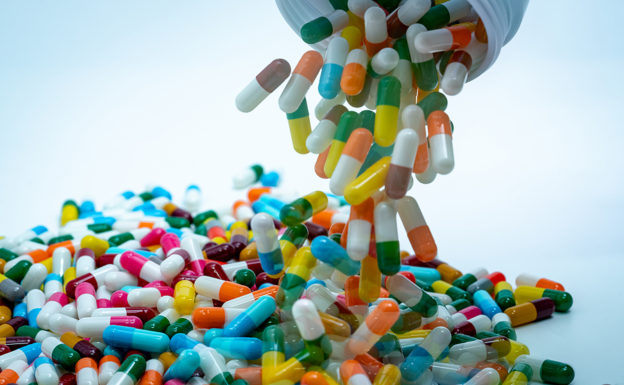By David Blyweiss, M.D., Advanced Natural Wellness
January 18, 2021
Did you ever have a really strong reaction to a medication?
Maybe a friend of yours swears by it, but when you take the same exact pills, your body feels like you’ve been through the wringer.
Well, that’s not just your imagination.
People have different reactions to medications every day!
There’s actually a whole field of research that looks at how different groups of people react differently to medications.
It’s called pharmacogenomics.
Simply put, this is the study of how genes affect a person’s response to drugs. It’s a pretty new field actually.
Open your arteries, improve blood flow for a new health miracle...
Did you know your circulatory system has over 60,000 miles of arteries, veins and other blood vessels, if stretched end to end?
But as you age, your blood vessels undergo changes, which may cause them to stiffen, thicken and get clogged.
GOOD NEWS! Doctors have now identified a “Miracle Molecule” inside your arteries that helps OPEN your arteries and IMPROVE blood flow.
It’s what Dr. Valentin Fuster calls it, "One of the most important discoveries in the history of cardiovascular medicine."To you, that means...
- Healthy blood pressure
- Sharper mind and memory
- Skyrocketing energy and muscular strength
- Increased pleasure and passion in the bedroom
- Improved circulation to every cell and organ in your body
Go here to discover a new natural way to significantly boost the levels of this miracle molecule in YOUR body NOW!
It combines pharmacology (the study of drugs) with genomics (the study of genes and their functions.)
Basically, it looks at how your DNA affects the way you react to drugs. Your genetic makeup can affect whether you have a bad reaction to a drug, whether a drug helps you, or if you have no reaction at all.
It works this way because some drugs need to attach to proteins on the surface of your cells — called receptors. Your genes determine the type of receptors you have on your cells. So, different receptors mean different reactions to drugs.
Some people can get by with a much lower amount of certain medications. Other people might need a much higher amount to see a benefit.
I’m telling you about this because this field of medicine is working to develop safe and effective medication doses that will work for your own specific genetic makeup.
Designer medication… tailored JUST for you.
This new field of study came about because scientists were noticing the same thing you have at home. They found that most patient populations show a large range of responses to drug treatment.
Now, usually genetic factors are estimated to account for about 15-30% of these responses differences. But for some classes of drugs, genetics can play a much larger role — causing 95% of the variations we see.[1],[2],[3]
This whole idea that drug response could be determined by a person’s genes started back in the 1950s.[4] That’s when researchers found that a particular drug caused the rupture of red blood cells in African American patients but not in Caucasian patients.[5]
The World's Quickest Solution for Ending Prostate and Urinary Misery
This has recently been revealed to be one of the only real breakthroughs in prostate health.
The seeds of a strange fruit (sometimes called "Chinese Apples") hold powerful phytonutrients that are a revolution in prostate health.
In fact, UCLA and Veterans Administration research have now proved this to be true.
Not only that, but it may be the worlds quickest solution for ending prostate misery.
Simply stated, these phytonutrients represent a huge step beyond beta sitosterol, saw palmetto, and other phytosterols alone.
Simply click HERE if you want to have fast prostate relief...restful, uninterrupted sleep...no more constant "urges to go"...enhanced virility...and optimal prostate support for life.
There are over 30,000 known diseases out there. If we can combine our knowledge of drug science with the study of genes, we can actually create specific drug therapies that will work with very specific segments of the population.[6]
Drug companies like these ideas a lot too. That’s because 4% of all new medications are withdrawn from the market because users experience harmful side effects.[7]
If we can have a better idea of how a person will react to a medication, doctors will do a better job of choosing the right drug and dosage for every patient.
Drug companies will make more money. More people will find benefits from their medication. And patients won’t have to deal with as many side effects.
This individualized medicine may soon become a reality. We’ll be able to give you a better idea of how you’ll react to a specific medication. And we’ll be able to give you a better dosage amount to work with your specific body.
I know this all sounds great, but there’s one kicker…
Not all doctors know about this new field of medicine.
That’s why I want to make sure you have a strong understanding of the science behind this all. I want you to understand why it’s a good idea.
So, start asking your doctor to have you tested if they haven’t done so already. This way you can get an idea of what your own body’s genes are telling the drugs.
I’m guessing it may be a challenge to get your insurance to pay for it.
But it’s my belief that this testing will become standard practice in the near future. Before you start on any medication, you’ll have a very clear idea of how much to take and whether the drug will have an effect.
The answer is all right there, in your genes.
Sources:
[1] Evans WE, RellingMV.2004.Moving towards individualized medicine with pharmacogenomics. Nature 429:464–68
[2] EvansWE,McLeodHL. 2003. Pharmacogenomics—drug disposition, drug targets and side effects. N. Engl. J. Med.348:538–49
[3] Weinshilboum R. 2004. Inheritance and drug response. N. Engl. J. Med. 348:529–37
[4] Beutler E. 1969. Drug induced haemolytic anaemia. Pharmacol. Rev. 21:73–103
[5] Vogel F. 1959. Moderne Probleme der Humangenetik. Ergebn. Inn. Med.Kinderheilk 12:52–125
[6] Drews J. 1996. Genomic sciences and the Annu. Rev. Med. 2006.57:119-137. Downloaded from arjournals.annualreviews.org by UNIVERSIDAD DE VALENCIA on 07/04/06. For personal use only.
132 EICHELBAUM INGELMAN-SUNDBERG EVANS medicine of tomorrow. Nat. Biotechnol.
11:1516–18
[7] Jefferys DB, Leakey D, Lewis JA, et al.1998. New active substances authorized in the United Kingdom between 1972 and 1994. Br. J. Clin. Pharmacol. 45:151–56







